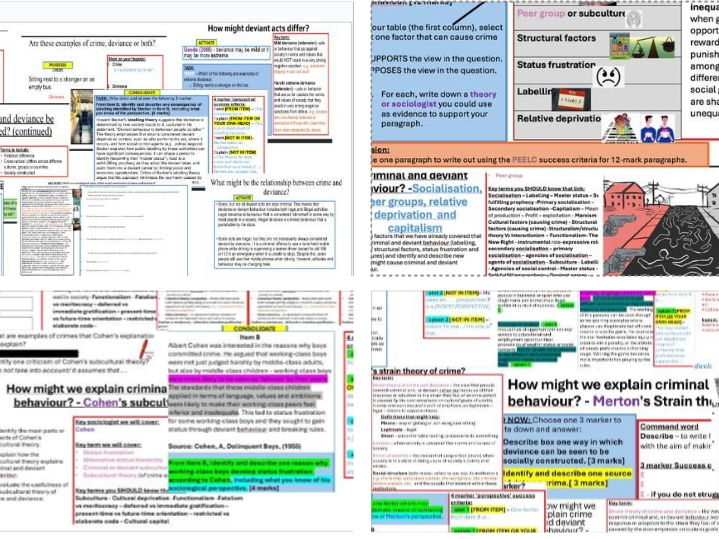Resources included (4)

AQA GCSE Sociology Crime - Explanations of crime (relative dep, capitalism, peer groups & socialisat

AQA GCSE Sociology: Crime - Merton's strain theory

AQA GCSE Sociology: Crime - Explanations of crime (Cohen’s subcultural theory)

AQA GCSE SOCIOLOGY: Crime and Deviance - The social construction of crime and deviance
L1 AQA GCSE SOCIOLOGY: Crime and Deviance - The social construction of crime and deviance
Detailed lesson with lots of scaffolding based on adaptive teaching that help students understand ‘Crime and Deviance - The social construction of crime and deviance’
-
Cover the following key terms: Crime, Deviance, The social construction of crime and deviance, Master status, Deviant career, Deviant subculture
-
Covers the following sociologists: Becker
-Includes a teaching to all activity
-Includes a 4 marker ‘perspective’ question with a success criteria and sentence starters for answer
-Has two lessons in one.
-Includes key term sheet with definitions of key terms covered during the lesson as well as definitions of key terms students should have previously learnt that link to the lesson.
**L2 AQA GCSE Sociology: Crime - **Merton’s strain theory
Detailed lesson with lots of scaffolding based on adaptive teaching that help students understand how the strain of anomie might lead to criminal and deviant behaviour. Describe the strain theory of crime and identify Merton’s four adaptations of the strain of anomie.
-
Cover the following key terms:
Strain theory of crime and deviance
Anomie
strain of Anomie -
Definitions that might help we will cover:
The American Dream
Means
Legitimate
Strain
Social structure (extension) -
Key terms you SHOULD know that link:
Functionalism
value consensus
social order
Consensus theory
structuralism vs interactionism
Determinism
Meritocracy -
Covers the following sociologists:
Merton -
Answers for ALL activities included
Includes a key term and definition sheet needed for the lesson -
Covers how to answer 4 marker ‘perspective’ exam question with a success criteria and scaffolding to help students answer it.
-
RESOURCES CAN BE FOUND AT THE END OF PPT
-
Starter activity gives the option of two 3 markers student can choose to answer and includes a student-friendly mark-scheme for each
**
L3 AQA GCSE Sociology: Crime - Explanations of crime (Cohen’s subcultural theory)
Detailed lesson with lots of scaffolding based on adaptive teaching that helps students understand ‘explanations of crime’
Status frustration, alternative status hierarchy, criminal or deviant subculture, subculture theory.
Cohen.
Answers to MOST activities included
Includes a key term and definition sheet needed for the lesson
Covers how to answer 4 marker ‘perspective’ exam question with a success criteria and scaffolding to help students answer it.
RESOURCES CAN BE FOUND AT THE END OF PPT
Starter activity gives the option of two 3 markers student can choose to answer and includes a student-friendly mark-scheme for each. These are the same options that can be found in the lesson for Merton’s strain theory (the idea is for student to pick the 3 marker they did not answer last lesson this lesson).
L4 AQA GCSE Sociology: Crime - Explanations of crime
'Detailed lesson with lots of scaffolding based on adaptive teaching that help students understand ‘Explanations of crime (relative deprivation, capitalism, peer groups and socialisation)’
Cover the following key terms:
Relative deprivation
Peer groups
Covers in some way all explanations or factors students show know when explaining crime and deviance
Includes a carousel activity with information sheets for students to cover socialisation, structural factors, peer groups (and subcultures) relative deprivation and peer group and subculture as explanations of crime.
Includes an activity to help students show knowledge and understanding of labelling, Merton’s strain theory and Cohen’s subcultural theory - ASSUMES STUDENTS HAVE PREVIOUSLY BEEN TAUGHT THIS - but makes reference to this in 12 mark activity (see below.
Answers for SOME activities included
Includes a key term and definition sheet needed for the lesson
Includes an activity to remind students how to answer 12 markers (to not get capped at 6/12) - INCLUDES ANSWERS FOR THIS
RESOURCES CAN BE FOUND AT THE END OF PPT
Something went wrong, please try again later.
This resource hasn't been reviewed yet
To ensure quality for our reviews, only customers who have purchased this resource can review it
to let us know if it violates our terms and conditions.
Our customer service team will review your report and will be in touch.
